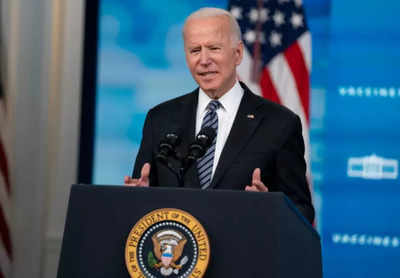
WASHINGTON: “America is back,” is the slogan of US President Joe Biden, but his unapologetic exit from Afghanistan suggests America will not return to business as usual.
Beyond the trauma of the Kabul evacuation, Biden is making a much broader comeback: a moratorium on using vast military resources to enforce order and American values around the planet.
“This decision about Afghanistan is not just about Afghanistan,” Biden said in a landmark speech on Tuesday. “It’s about ending an era of major military operations for other countries to remake.”
“Human rights will be at the heart of our foreign policy, but the way to do this is not through endless military deployments,” he said. “Our strategy has to change.”
Benjamin Haddad, director of the Europe Center at the Atlantic Council and an expert on transatlantic relations, called the speech “one of the most blatant rejections of liberal internationalism by any US president in the past decades”.
For Americans who are fond of imagining their country as a unique, unstoppable superpower—the winner of the Cold War, then the horrific military interventionist everywhere from Iraq to Africa—this is a blow.
For most, though, polls show Biden’s pivot is likely to be popular.
Biden’s presidency is generally seen as a rejection of the Donald Trump administration.
It’s true that the moment Biden entered the Oval Office on January 20th—things from the White House decor to re-entering the Paris climate accord—changed a lot.
But Biden’s outspoken abandonment of US military exploits – whom critics call the “policeman of the world” – is Trumpian.
Charles Franklin, a Marquette Law School professor and director of the Marquette Opinion Poll, said when Biden declared, “It is time to end the war forever,” regarding Afghanistan, “it could easily be Trump.” ”
“The public today is not committed to a greater international role, certainly not the kind that the US played in the 1950s-1990s,” Franklin told AFP.
With regard to Afghanistan in particular, polls show strong support for an exit—77 percent, according to a new Washington Post-ABC News poll—even though Biden is batting for a chaotic way of returning.
While Biden is very different from the separatist, Trump is enthusiastic about forging an alliance. The Biden theory states that the United States may not be a furious global cop, but it may be the leader of a friendly community.
His administration moved swiftly to put Washington back at the center of troublesome talks between major powers and Iran over its nuclear policy, the climate deal and traditional alliances such as NATO.
A trip to Europe in June for the G7 and NATO summits—Biden’s only foreign trip to date—was akin to the diplomatic equivalent of a band getting back together.
Analysts say that now, however, some of those allies may be feeling nervous.
Tricia Bacon, a counter-terrorism expert in the US University’s law department, told AFP that allies felt “great disappointment” at the lack of coordination in the US departure from Afghanistan.
“The message to America has to be very consistent to regain the credibility it has lost,” she said.
And Imad Harb, research director at the Arab Center in Washington, said European partners are not the only ones who have been surprised.
“Arab regimes accustomed to close ties with the United States should be concerned about what happened in Afghanistan,” he wrote on the think tank’s website.
“Biden may have finally covered up on US military intervention in the wider Middle East,” Harb said.
Harb described Biden’s post-return speech as “serious”, saying that clearly “outlining a ‘Biden doctrine'” would have sowed “horror” in a region that for two decades had no reality other than US intervention. does not know.
FacebookTwitterLinkedinE-mail
.